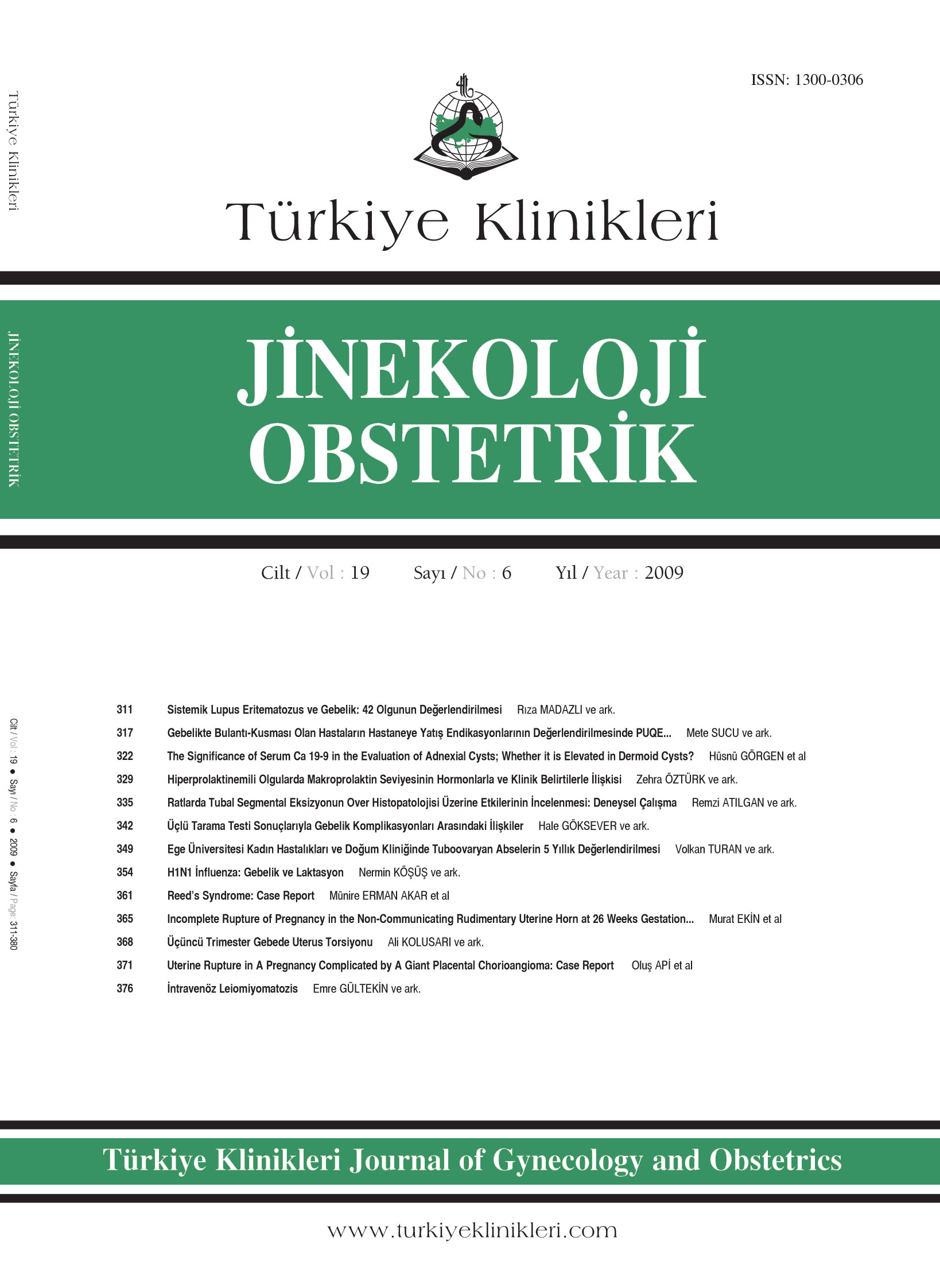Open Access
Peer Reviewed
CASE REPORTS
2240 Viewed1027 Downloaded
Uterine Rupture in A Pregnancy Complicated By A Giant Placental Chorioangioma: Case Report
Dev Bir Plasental Koryoanjiyoma ile Komplike Olan Bir Gebelikte Uterin Rüptür
Turkiye Klinikleri J Gynecol Obst. 2009;19(6):371-5
Article Language: EN
Copyright Ⓒ 2025 by Türkiye Klinikleri. This is an open access article under the CC BY-NC-ND license (http://creativecommons.org/licenses/by-nc-nd/4.0/)
ABSTRACT
No case of uterine rupture associated with a chorioangioma has been reported up to date. Herein, we present a pregnancy complicated with spontaneous uterine rupture due to polyhydramnios secondary to a giant placental chorioangioma in a patient with two previous cesarean sections at the early third trimester. The patient who is at 29 weeks of gestation was admitted because of sudden abdominal pain and distension. Her obstetric history revealed two uncomplicated previous lower segment cesarean sections. The prenatal course of this pregnancy had been uneventful so far and her only ultrasonographic evaluation which was performed three weeks ago was reported to be normal. Upon vaginal examination bleeding was detected and the uterine cervix was not dilated. Ultrasound revealed a single live fetus with a transverse lie and a markedly increased amniotic fluid volume and the examination did not reveal any obvious fetal abnormality; however the placenta showed a well-defined solid mass and an amniotic sac protruding out from the Kerr incision was seen. On cardiotocography, severe persistent fetal bradycardia was detected. An emergency cesarean section was performed with the prediagnosis of uterine rupture secondary to polyhydramnios due to a possible placental chorioangioma. Final pathology was chorioangioma.
No case of uterine rupture associated with a chorioangioma has been reported up to date. Herein, we present a pregnancy complicated with spontaneous uterine rupture due to polyhydramnios secondary to a giant placental chorioangioma in a patient with two previous cesarean sections at the early third trimester. The patient who is at 29 weeks of gestation was admitted because of sudden abdominal pain and distension. Her obstetric history revealed two uncomplicated previous lower segment cesarean sections. The prenatal course of this pregnancy had been uneventful so far and her only ultrasonographic evaluation which was performed three weeks ago was reported to be normal. Upon vaginal examination bleeding was detected and the uterine cervix was not dilated. Ultrasound revealed a single live fetus with a transverse lie and a markedly increased amniotic fluid volume and the examination did not reveal any obvious fetal abnormality; however the placenta showed a well-defined solid mass and an amniotic sac protruding out from the Kerr incision was seen. On cardiotocography, severe persistent fetal bradycardia was detected. An emergency cesarean section was performed with the prediagnosis of uterine rupture secondary to polyhydramnios due to a possible placental chorioangioma. Final pathology was chorioangioma.
ÖZET
Bugüne dek, koryoanjiyoma ile ilişkili uterin rüptür olgusu bildirilmemiştir. Burada, üçüncü trimesterin erken döneminde, dev bir plasental koryoanjiyomaya sekonder olarak gelişmiş polihidramniosa bağlı spontan uterin rüptürle komplike olan bir gebelik olgusu sunmaktayız. Yirmi dokuzuncu gebelik haftasında olan hasta, ani başlayan karın ağrısı ve karında şişkinlik şikayetleri ile başvurmuştur. Obstetrik hikâyesinde iki adet geçirilmiş sezaryen bulunmaktadır. Gebeliği bugüne dek sorunsuz geçmiş ve üç hafta önce yapılan ultrasonografinin normal olduğu bildirilmiştir. Vajinal muayenede kanama vardı ve serviks dilate değildir. Ultrasonda transvers duruşta tek bir canlı fetus ve belirgin olarak artmış amniyotik sıvı hacmi saptanmıştı, görünür fetal anomali yoktu; ancak plasentada solid bir kitle ve Kerr insizyon hattından taşan amniyotik kese görülmekteydi. Kardiyotokografide belirgin kalıcı fetal taşikardi vardı. Hastaya, olası plasental koryoanjiyomaya sekonder acil sezaryen yapılmıştır. Patolojik inceleme tanıyı doğrulamıştır.
Bugüne dek, koryoanjiyoma ile ilişkili uterin rüptür olgusu bildirilmemiştir. Burada, üçüncü trimesterin erken döneminde, dev bir plasental koryoanjiyomaya sekonder olarak gelişmiş polihidramniosa bağlı spontan uterin rüptürle komplike olan bir gebelik olgusu sunmaktayız. Yirmi dokuzuncu gebelik haftasında olan hasta, ani başlayan karın ağrısı ve karında şişkinlik şikayetleri ile başvurmuştur. Obstetrik hikâyesinde iki adet geçirilmiş sezaryen bulunmaktadır. Gebeliği bugüne dek sorunsuz geçmiş ve üç hafta önce yapılan ultrasonografinin normal olduğu bildirilmiştir. Vajinal muayenede kanama vardı ve serviks dilate değildir. Ultrasonda transvers duruşta tek bir canlı fetus ve belirgin olarak artmış amniyotik sıvı hacmi saptanmıştı, görünür fetal anomali yoktu; ancak plasentada solid bir kitle ve Kerr insizyon hattından taşan amniyotik kese görülmekteydi. Kardiyotokografide belirgin kalıcı fetal taşikardi vardı. Hastaya, olası plasental koryoanjiyomaya sekonder acil sezaryen yapılmıştır. Patolojik inceleme tanıyı doğrulamıştır.
MENU
POPULAR ARTICLES
MOST DOWNLOADED ARTICLES





This journal is licensed under a Creative Commons Attribution-NonCommercial-NoDerivatives 4.0 International License.










